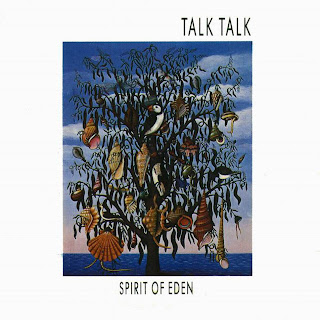+-+Front+cover.jpg)
"Spirit of Eden" was published in 1988 and is generally considered the masterpiece of Talk Talk, with its perfect combination of rock, jazz, music classical and 'ambient music'. The album was entirely composed by singer-keyboardist-guitarist from the multi-instrumentalist Mark Hollis and Friese-Greene Rim and performed by the band along with a large group of musicians playing instruments of various kinds.
Compared to previous works of Talk Talk, "Spirit of Eden" was certainly not a success from a commercial standpoint, but many critics have praised it without delay, considered essential for future development of the movement 'post-rock' of the year Ninety (like the next "Laughing stock", which I posted on September 8, 2008). The texts, written by Mark Hollis, contain allusions to religious and spiritual, while accepting the 'religious', the same Hollis said that it did not based on religious beliefs in particular, but on a vague concept of 'humanism'.
The experimental nature and 'moody' makes it difficult to fully appreciate the album at first listen: I had the same impression when I listened the first time that Talk Talk had knocked out the album snippets here and there patching music at random and scattered. However, repeated listens, I began to appreciate the evocative nature of "Spirit of Eden", an album that I consider - including the fact that, after all, a fan of progressive rock - one of the best albums of the eighties.
Compared to previous works of Talk Talk, "Spirit of Eden" was certainly not a success from a commercial standpoint, but many critics have praised it without delay, considered essential for future development of the movement 'post-rock' of the year Ninety (like the next "Laughing stock", which I posted on September 8, 2008). The texts, written by Mark Hollis, contain allusions to religious and spiritual, while accepting the 'religious', the same Hollis said that it did not based on religious beliefs in particular, but on a vague concept of 'humanism'.
The experimental nature and 'moody' makes it difficult to fully appreciate the album at first listen: I had the same impression when I listened the first time that Talk Talk had knocked out the album snippets here and there patching music at random and scattered. However, repeated listens, I began to appreciate the evocative nature of "Spirit of Eden", an album that I consider - including the fact that, after all, a fan of progressive rock - one of the best albums of the eighties.
personal mark ( poor / fair / good / separate / very good / excellent ): Distinct / Good .
Released in 1988, “Spirit of Eden” is considered to be Talk Talk’s masterpiece album, combining elements of rock, jazz, classical music and ambient music. It was composed entirely by Mark Hollis and Rim Friese-Greene and performed by the Talk Talk together with a host of numerous musicians playing a large number of instruments.
Compared to the band’s previous releases, “Spirit of Eden” was not a commercial success; however, many critics praise the album and consider it to have been influential to the post-rock movement of the 1990s, just like the band’s subsequent release “Laughing stock” (refer to my post dated September 8th, 2008). The lyrics, written by Mark Hollis, contain religious and spiritual references: though Hollis himself acknowledged that his lyrics were religious, he said they were not based on a specific religion, preferring to think of them as “humanitarian”.
The moody, experimental nature of the album makes it a challenge to be able to ‘catch’ it on the very first listens: in fact, when I myself listened to it for the first time, it seemed to me as if Talk Talk had made this album by simply building up chunks of music in a random, scrambled order. Then, as I listened to “Spirit of Eden” some more times, I began to appreciate the evocative nature of this album which I rate - due to my being a prog rock fan, all things considered - as one of the best releases in the 1980s.
Compared to the band’s previous releases, “Spirit of Eden” was not a commercial success; however, many critics praise the album and consider it to have been influential to the post-rock movement of the 1990s, just like the band’s subsequent release “Laughing stock” (refer to my post dated September 8th, 2008). The lyrics, written by Mark Hollis, contain religious and spiritual references: though Hollis himself acknowledged that his lyrics were religious, he said they were not based on a specific religion, preferring to think of them as “humanitarian”.
The moody, experimental nature of the album makes it a challenge to be able to ‘catch’ it on the very first listens: in fact, when I myself listened to it for the first time, it seemed to me as if Talk Talk had made this album by simply building up chunks of music in a random, scrambled order. Then, as I listened to “Spirit of Eden” some more times, I began to appreciate the evocative nature of this album which I rate - due to my being a prog rock fan, all things considered - as one of the best releases in the 1980s.
My personal mark (poor / pass / good / fairly good / very good / excellent): Fairly / Very good .
TALK TALK (1988):
Mark Hollis - vocals, keyboards, guitar (vocals, keyboards, guitar)
Tim Friese-Greene - keyboards , harmonium, guitar (keyboards, harmonium, guitar)
Lee Harris - drums (drums) Paul Webb
low (bass guitar)
Tim Friese-Greene - keyboards , harmonium, guitar (keyboards, harmonium, guitar)
Lee Harris - drums (drums) Paul Webb
low (bass guitar)
TRACK LIST:
1. The rainbow (Eded / Desire)
2. Inheritance
3. I believe in you
4. Wealth
2. Inheritance
3. I believe in you
4. Wealth
SPIRIT OF EDEN (TALK TALK) - 75.5 MB
+-+Front+cover.JPG)
+-+Asia+(Front+cover).jpg)
+-+Front+cover.jpg)